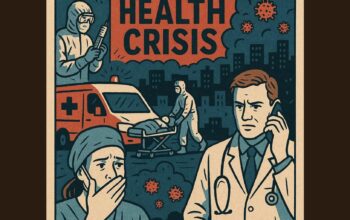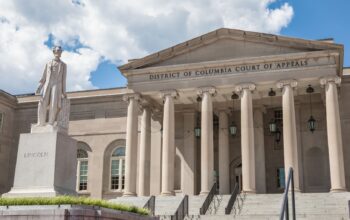by Stacy M. Brown
As House Republicans seek to put the finishing touches on the “One Big Beautiful Bill,” or what Democrats call Donald Trump’s “One Big Ugly Bill,” which narrowly passed the Senate, roughly 11.8 million adults and children nationwide will now be put at risk of losing health insurance once the measure becomes law.
The sweeping legislation targets Medicaid, the Affordable Care Act (ACA), and the Children’s Health Insurance Program (CHIP), seeking to wring nearly $1 trillion in savings by scaling back enrollment and tightening eligibility over the next decade. However, many say these attempted savings put the District and nation’s most vulnerable at further risk.
“Today is a dark day for the millions of Americans who rely on this nation’s promises of care, fairness and opportunity,” said U.S. Rep. Oye Owelowa (D), the District’s shadow representative who is also a pharmacist. “With the Senate’s passage of the so-called ‘One Big Beautiful Bill,’ we are witnessing a dangerous unraveling of that social contract disguised as fiscal reform and economic growth.”
While Trump and the GOP claim they are seeking to cut waste, the president’s return to the White House has already resulted in at least $72 million to $92 million in taxpayer-funded expenses tied to what critics call wasteful personal and political indulgences.
A central example of the president’s spending is the sprawling Army 250th Anniversary Parade, held on June 14—Trump’s 79th birthday—which cost an estimated $25 million to $45 million for logistics, troop deployments, tanks, helicopters, and military flyovers, plus up to $16 million more in road repairs and infrastructure damage from the heavy tracked vehicles rolling across Washington, D.C.
Meanwhile, Trump’s frequent golf trips to his properties—especially Mar-a-Lago and Bedminster—had already cost taxpayers at least $26 million by late March, with subsequent weekend visits pushing the total likely past $30 million, not counting hundreds of thousands in Secret Service golf cart rentals and portable toilets contracted through the end of 2025.
Environmental analysts estimate the parade alone generated over 2 million kilograms of CO₂ emissions, while additional cleanup, police overtime, and city service costs remain to be fully disclosed.
Combined, these expenditures—funding lavish displays of military might and repeated recreational travel—have drawn condemnation from fiscal watchdogs and public officials who argue the money could have been better spent repairing roads, funding VA hospitals, bolstering Medicaid, or addressing persistent shortages in public health infrastructure.
[Trump’s parade will cost taxpayers up to $45 million,” Sen. Elizabeth Warren (D) of Massachusetts wrote on X, formerly known as Twitter. “For example, with that money, we could expand health care & food assistance for veterans. A taxpayer-paid birthday gift to Trump sounds like government waste to me.”
Washingtonians Will Feel the Sting of the Bill if Passed
The impact of Trump’s “One Big Beautiful Bill” could be especially severe in the District of Columbia.
According to estimates from the Kaiser Family Foundation (KFF), based on projections from the Congressional Budget Office, the bill alone could increase the District’s uninsured rate by five percentage points, one of the most significant jumps among any state or territory. That figure does not even account for the pending expiration of enhanced ACA premium tax credits, which could drive the uninsured rate even higher.
“Let’s be clear: this bill is not beautiful. It is brutal,” Owelowa emphasized. “It slashes more than $800 billion from Medicaid, cuts $300 billion from nutrition assistance programs like SNAP, and eliminates vital clean energy investments, all to make room for over $2 trillion in tax breaks for the wealthiest households and corporations.”
The District has long maintained some of the country’s most expansive Medicaid policies. In 2024, D.C. reported that nearly 300,000 residents were enrolled in Medicaid and CHIP, accounting for close to 40% of the city’s population. The bill’s provisions, such as mandatory work reporting requirements and new penalties for states operating expanded coverage, threaten to roll back those gains.
Nationally, about 78 million adults and children currently rely on Medicaid, while another 24 million are covered through ACA marketplace plans. If the bill passes and the enhanced tax credits expire, the CBO projects that 16 million more people will be uninsured by 2034 compared to current law.
Policy experts warn that the ripple effects in D.C. could be profound. Hospitals and clinics across the city could see a surge in uncompensated care costs as newly uninsured patients forego preventive treatment and delay needed care. Local public health programs may also face funding shortfalls as enrollment-driven federal dollars decrease.
Medicaid is administered jointly by federal and state governments, operating under names like Medi-Cal in California, MassHealth in Massachusetts, and simply Medicaid in D.C. For many low-income residents, it has been the cornerstone of health security.
While supporters of the bill argue it will reduce federal spending and promote “personal responsibility,” critics counter that it amounts to a blunt-force attack on vulnerable communities. D.C.’s safety-net providers have already expressed alarm over the prospect of thousands losing coverage practically overnight.
If enacted, the District of Columbia will be among the jurisdictions hardest hit by the largest rollback of federally funded health insurance in a generation.
Declaring he stands “firmly in opposition to this legislation,” Owelowa offered Washingtonians a call to action in order to combat the “One Big Beautiful Bill.”
“Now more than ever, we must pursue policies that lift people up, protect access to health care and advance economic opportunities and not push through ideologically driven measures that deepen inequality and harm our most underserved communities,” Owelowa continued. “We must reject this bill and fight for a future that lifts everyone, not just those already at the top.”
Source: Published without changes from Washington Informer Newspaper




